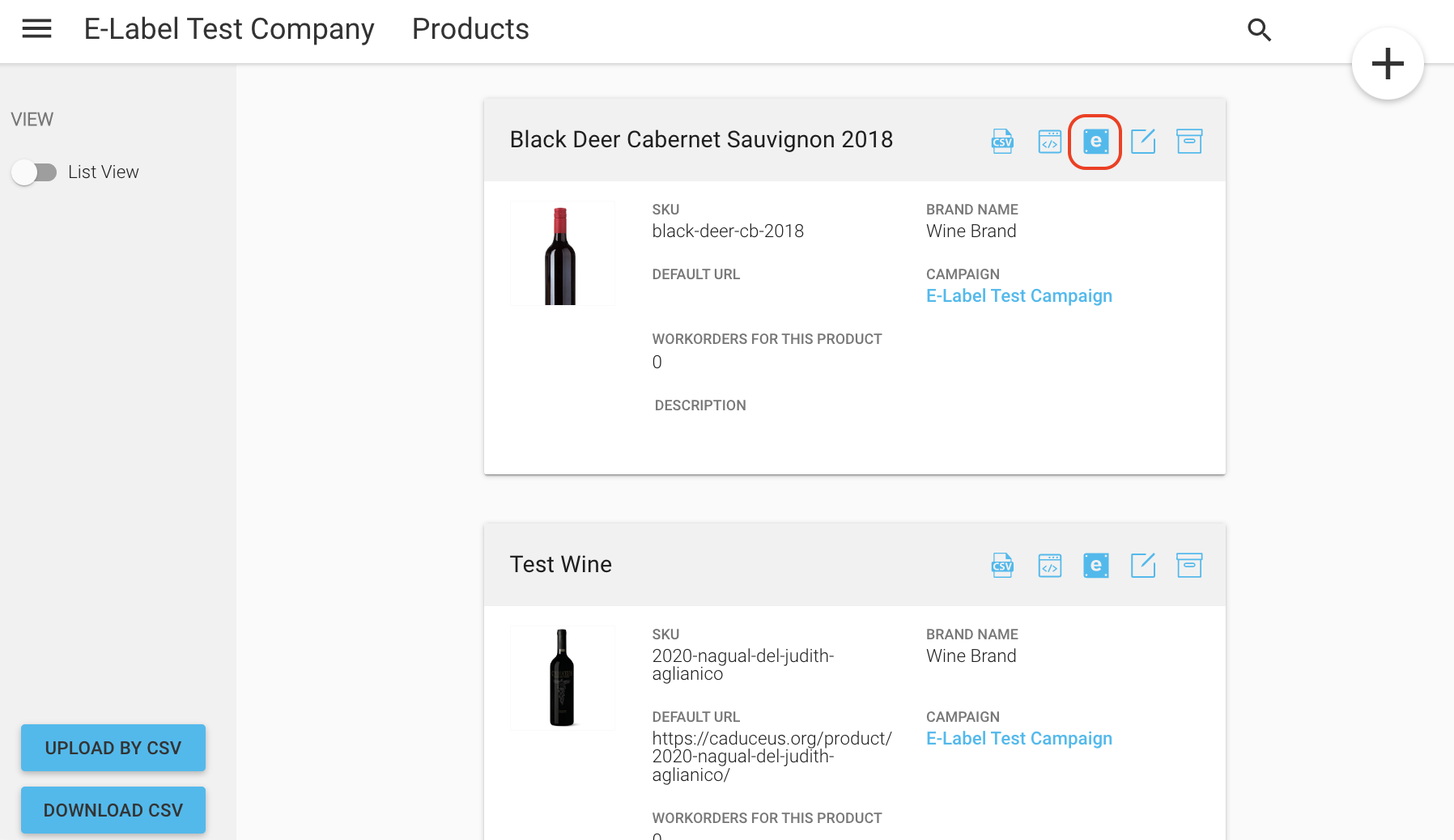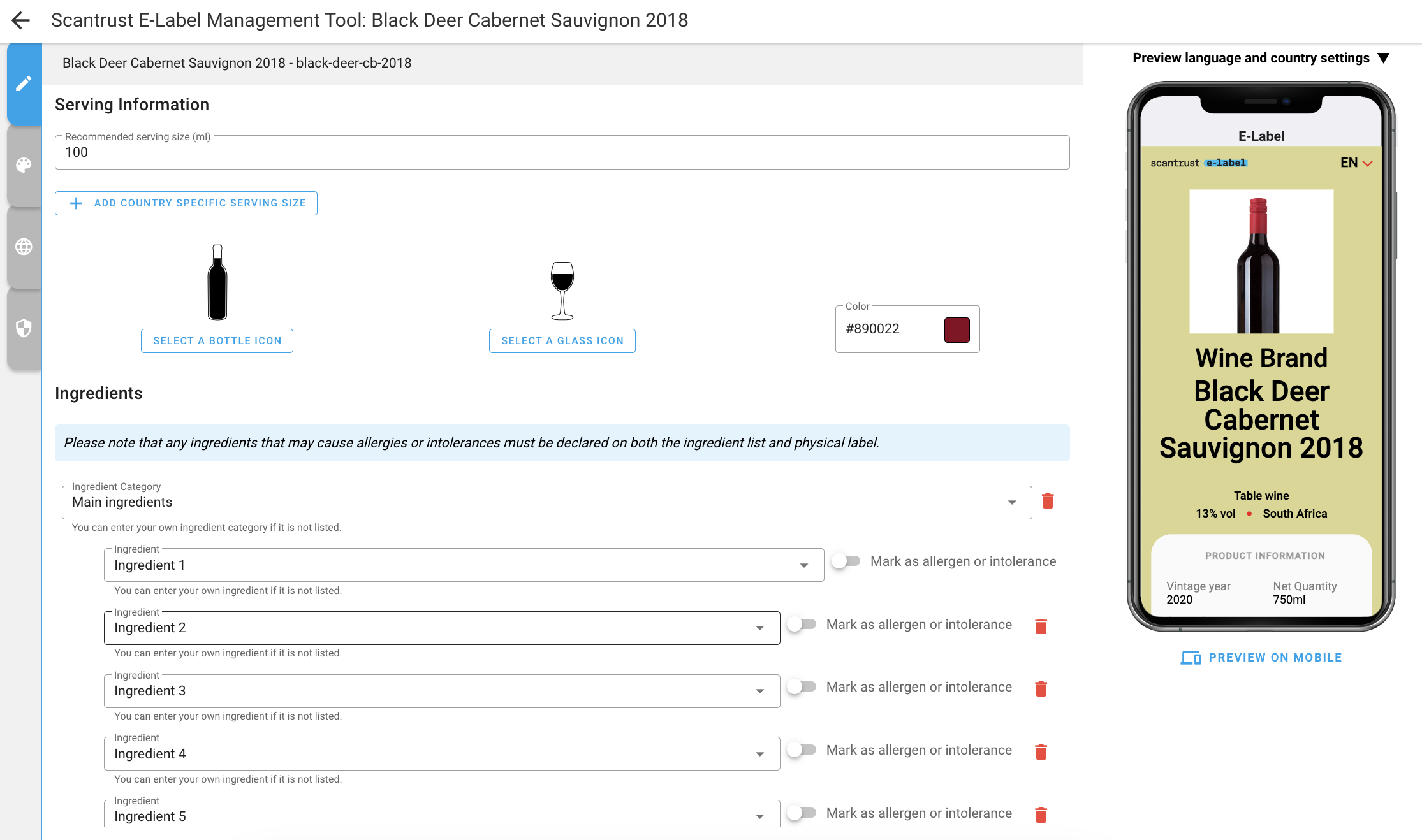e-label information
Introduction
Electronic labeling, or e-labels, for wine and spirits is governed by EU Regulation 2019/787, which is also known as the "Wine Act". This regulation sets the rules for the production, presentation, and labeling of wine, including the use of e-labels. In addition, the EU Regulation 1169/2011 (Food Information to Consumers Regulation or FIC Regulation) also sets the requirements for labeling.
e-labels appear on product packaging or on digital marketing materials and must contain all of the legally required information about a product, including, the product name or brand, volume, alcohol content, ingredients, and allergen information. The e-label format must comply with the EU regulations for food and beverage labeling, including the requirements for font size, language, and legibility.
There are 3 ways e-labels can be managed in Scantrust
- Edit e-label data in the scantrust portal under the products > e-label page
- Using the Scantrust excel file bulk upload feature available in our enterprise plans
- Upload the e-label data for each product with the Scantrust e-label JSON API


The below process describes how to upload and download e-label data using the Scantrust REST Api. Because e-label data is set on the product, you will need a UAT token with the same minimum permissions as for managing products:
product_createproduct_deleteproduct_editproduct_view
The UAT token must be set in the header fields of all requests as described in Authentication & Tokens.
API Design
POST: /api/v2/products/{product_id}/elabel/
Sets all e-label JSON data for a product
Response (201): Status CREATED
{
"name": "demoproduct", // product sku
"is_published": false,
"data": {
"editor": { ... },
"published": { ... }
}
}
Note that a complete JSON object needs to be posted each time an e-label is updated. This endpoint does not support partial updates of the JSON.
For an example of a full set of data to POST for the editor section, see JSON example here
Once the data object is ready to be published, you will need to do another POST request to set the is_published flag to true.
GET: /api/v2/products/{product_id}/elabel/
Returns all e-label JSON data for a product
Response (200): Status OK
Example JSON:
{
"id": 1272,
"company": 7583,
"name": "black-deer-cb-2018",
"data": {
"editor": {
"type": "wine",
"theme": { "primary": "#F01515", "background": "#D8D790", "alcoholColor": "#890022" },
"footer": { "first_line": "", "second_line": "" },
"header": { "logo": "", "title": "E-Label" },
"default_country": "",
"default_language": "en",
"reviewed_languages": ["en"],
"available_languages": ["en"],
"enforce_language_per_country": false,
"sections": [
{ "key": "product-infos" },
{ "key": "geographical-indications" },
{ "key": "serving-infos" },
{ "key": "ingredients" },
{ "key": "allergens" },
{ "key": "nutrition" },
{ "key": "responsible-consumption" },
{ "key": "sustainability" },
{ "key": "business-operator" },
{ "key": "brand-infos" }
],
... (JSON objects for each of the above sections)
"published": {
...
}
An e-label JSON contains 2 set of the e-label data at all time.
editor: draft version of the data, the data that you see in when using the e-label management tool.published: Live data. What consumer see when they open an e-label landing page.
The elabel JSON consists of a set of generic fields and 10 sections each with its own JSON object:
Generic Fields
type: wine, spirit or aromatised_winetheme: sets theprimary,backgroundandalcoholColorof the landing pagefooter: sets the text for thefirst_lineandsecond_lineof the e-label footerheader: sets thelogoandtitle(default: "E-Label")default_country: sets the data for the country to be shown when an e-label is scanned in a non-EU country. This is a 2 letter uppercase country code, eg: 'FR' for Francedefault_language: sets the default language (default: English), this is a 2 letter lowercase language code, eg: 'en' for Englishreviewed_languages: array of reviewed languages available to users on the landing page.available_languages: array of available languages that may not have been reviewed yet. The review process happens in the translation section of the e-label editor. Once a language gets 'approved' it will be added to thereviewed_languagesarray.enforce_language_per_country: forces a fixed language for each country (default: false)
Section Objects
- Product Information
product-infos - Ingredients
ingredients - Serving Information
serving-infos - Nutrition Table
nutrition - Responsible Consumption Message
responsible-consumption - Sustainability Certifications
sustainability - Geographic Indications
geographical-indications - Business Operators
business-operator - Branding Info
brand-info - Impressum
impressum
Each section contains variable information inluding country specific data and translations fields as well as pre-translated system keys
These fields will be formatted as follow:
/* country specific field */
"serving": {
"default": 100, // default value
"FR": 76 // country specific value
...
}
/* translations field */
"product_name": {
"en": "Demo Product Name",
"de": "Name des Demoprodukts",
"fr": "Nom du produit de démonstration"
...
}
/* system key field */
"type": "wine_type_wine"
/* non-translated field */
"vine_variety": "Merlot"
Fallback behaviour:
- for country specific fields, if a the country does not have a specific value, it will fallback to the
defaultvalue. - for translations fields, if there is no entry for the selected language on the landing page, it will fallback to the
default_languagevalue
System keys
System keys are a set of pre-translated value used throughout the e-label. All the values that you can usually see from our various dropdown in the editor are based on system keys. When possible, you should use these keys since it would greatly reduce the workload required to create an e-label JSON since all the translations would automatically work for these terms.
For a full list of system keys please refer to this page
In most cases, a system key field can also be used like a translations field by simply replacing the content from a key to an object containing the translations.
product-infos
System key fields:
typewine_sweetnesswine_colourproduction_methodbottled_in_protected_atmosphere: Only needed if product uses packaging gases
Translation fields:
product_namesales_descriptiontraditional_termsproduction_method: use system key if possibletype: use system key if possible
Non-translated fields:
vine_variety
Other fields
origin: 2 letter uppercase country code arrayvolumes: bottle volumes in ML string arrayalcohol_volume: alcohol volume as a string
"product-infos": {
"type": "wine_type_wine",
"origin": [
"FR"
],
"volumes": [
"750"
],
"product_name": {
"en": "Demo Product Name",
"de": "Name des Demoprodukts",
"nl": "",
"fr": "Nom du produit de démonstration"
},
"alcohol_volume": "13",
"sales_description": {
"en": "A product description",
"de": "Eine Produktbeschreibung",
"fr": "Une description du produit"
},
"traditional_terms": {},
"bottled_in_protected_atmosphere": "bottled_in_protected_atmosphere_1",
"vintage_year": "2018",
"wine_sweetness": "wine_sweetness_extra_dry",
"vine_variety": "Merlot",
"wine_colour": "wine_colour_red",
"production_method": "production_methods_barrel_aged"
}
ingredients
There are 2 ways of declaring your ingredient list:
- Using the scantrust system keys: set
use_free_formtofalse. This is the recommended approach - Free text field: set
use_free_formtotrue
If you chose to use the free text field option, you will need to fully format and translate your ingredient list according to the regulations. If you use the system keys, all the formatting and translations will be handled automatically by the e-label landing page.
Declare using system keys
Each ingredient is an individual object in the list array and uses the following attributes:
category: system-key fielddescription: system-key field, can also contain translationsis_organic: boolean, defines if an ingredient should appear as organicis_allergen: boolean, defines if an ingredient should appear as allergenis_contained_display: boolean, this defines how a category should be formatted. This will only affect a few specific categories, if you aren't sure how a category should be displayed, set this tofalse
"ingredients": {
"list": [
{
"category": "ingredient_category_main_ingredients",
"description": "ingredient_grapes",
"is_contained_display": false,
"is_organic": true
},
{
"description": "ingredient_calcium_sulfate",
"category": "ingredient_category_acidity_regulators",
"is_contained_display": false
},
{
"description": "ingredient_tartaric_acid",
"category": "ingredient_category_acidity_regulators",
"is_contained_display": false
},
{
"description": {
"en": "Special ingredient",
"fr": "Ingrédient spécial"
...
},
"category": "ingredient_category_antioxidant",
"is_allergen": true
}
],
"free_text": {
"en": "Alcohol of vine origin*, Acidity regulators contains Calcium sulphate and/or Tartaric acid (L(+)-), Colours",
"fr": "Alcool d'origine viticole*, Régulateurs d'acidité contient Sulfate de calcium et/ou Acide tartrique [L(+)-], colorants"
...
},
"use_free_form": false
},
serving-infos
Country specific fields:
unit: Unit to show for the serving size & volume for a specific country. OnlyCLandMLare currently supportedserving: Serving size per country in ML
System key fields:
glass_icon: Glass icon displayed on the landing page pagebottle_icon: Bottle icon displayed on the page
"serving-infos": {
"unit": {
"FR": "CL",
"default": "ML"
},
"serving": {
"default": 100,
"FR": 75
},
"glass_icon": "default_wine",
"bottle_icon": "default_wine"
},
nutrition
The nutrition table is an array containing each nutritional information line as well as some nested information under specific items.
Fields:
key: System key, do not change
unit: Unit displayed for that line, do not change
per_100ml: Number
less_operator: Set to true if you want the entry to show as < 0g instead of 0g
The structure and order of this table has to be identical to the example below in order to respect the regulation.
"nutrition": {
"table": [
{
"key": "energy",
"unit": "kJ",
"children": [
{
"key": null,
"unit": "kcal",
"per_100ml": 75,
"less_operator": false
}
],
"per_100ml": 312,
"less_operator": false
},
{
"key": "fat",
"unit": "g",
"children": [
{
"key": "saturated_fat",
"unit": "g",
"per_100ml": 0.5,
"less_operator": false
}
],
"per_100ml": 0.5,
"less_operator": false
},
{
"key": "carbohydrate",
"unit": "g",
"children": [
{
"key": "sugar",
"unit": "g",
"per_100ml": 0,
"less_operator": false
}
],
"per_100ml": 0.4,
"less_operator": false
},
{
"key": "protein",
"unit": "g",
"per_100ml": 0,
"less_operator": false
},
{
"key": "salt",
"unit": "g",
"per_100ml": 0.5,
"less_operator": false
}
]
},
responsible-consumption
Translations fields
description: Custom responsible consumption message
System keys fields
icons: Array of system keys icons.
Other fields
show_responsible_message: Show default responsible message: "Alcohol abuse is dangerous to your health."responsible_drinking_logo: Show the "Wine in moderation" or "Drink responsibly" official images depending on your product type.custom_icons: Array of custom icons.name: file name, internalurl: file urlwide: boolean, defines if the image should take the full width of the screen when displayedcountries: Array of countries where the icon should be visible. Useallto show everywhere, use 2 letter uppercase country code otherwise
"responsible-consumption": {
"icons": [
"0",
"1",
"2"
],
"description": {
"en": "Don't drink and drive",
"fr": "Boire ou conduire, il faut choisir"
},
"custom_icons": [
{
"name": "custom image",
"url": "https://cc.staging.scantrust.io/c/6644/stcfile/blob-ngneoq",
"wide": false,
"countries": [
"all"
]
}
],
"show_responsible_message": true,
"responsible_drinking_logo": true
},
sustainability
Translation fields
organic_description: A sustainability message related to organicrecyclability_description: A sustainability message related to recyclabilitycertifications_description: A sustainability message related to certifications
System keys fields
organic_icons: Array of system keys icons.recyclability_icons: Array of system keys icons.certifications_icons: Array of system keys icons.
Other fields
italian_recyclability: Italian recycling law module, no documentation available yet, keep the structure identical to the example json below.custom_icons: Array of custom icons.name: file name, internalurl: file urlwide: boolean, defines if the image should take the full width of the screen when displayedcountries: Array of countries where the icon should be visible. Useallto show everywhere, use 2 letter uppercase country code otherwise
"sustainability": {
"custom_icons": [
{
"name": "custom image",
"url": "https://cc.staging.scantrust.io/c/6644/stcfile/blob-ngneoq",
"wide": false,
"countries": [
"all"
]
}
],
"organic_icons": [
"1",
"2"
],
"organic_description": {
"en": "An organic message",
"de": "Eine organische Botschaft",
"fr": "Un message organique"
...
},
"recyclability_icons": [
"6"
],
"certifications_icons": [
"1"
],
"italian_recyclability": {
"list": [],
"is_enabled": false
},
"recyclability_description": {
"en": "A sustainability message",
"de": "Eine Botschaft zur Nachhaltigkeit",
"fr": "Un message de durabilité"
...
},
"certifications_description": {
"en": "A certification message",
"de": "Eine Zertifizierungsnachricht",
"fr": "Un message de certification"
...
}
},
geographical-indications
System keys fields:
icon: PDO / PGI system key icon
Non-translated fields:
description
"geographical-indications": {
"list": [
{
"description": "AOC Pinot noir",
"icon": "0"
}
]
},
business-operator
Country specific fields:
bottled_by: Bottler address per countryimported_by: Importer address per countryproducted_by: Producer address per country
"business-operator": {
"bottled_by": {
"default": "Chateau Demo, 333 avenue de Bordeaux",
"FR": "Custom bottler address for France"
},
"imported_by": {
"default": "Importer Name, 333 avenue de Bordeaux",
"FR": "Custom importer address for France"
},
"produced_by": {
"default": "Chateau Demo, 333 avenue de Bordeaux",
"FR": "Custom producer address for France"
}
},
brand-info
Translation fields
description
Other fields
image: Image urltext_color: Text color as an hex stringlink: URL to the brand website. Only available forspirittemplate type
"brand-infos": {
"link": "",
"image": "https://cc.staging.scantrust.io/c/6644/stcfile/blob-joobpu",
"text_color": "#FFFFFF",
"description": {
"en": "Brand message",
"fr": "Message de la marque"
}
},
impressum
Country specific fields
free_text: Free text field containing impressum informations saved as an HTML string.
"impressum": {
"free_text": {
"default": "<p>An impressum</p>",
"DE": "<p>An impressum for germany</p>"
}
},